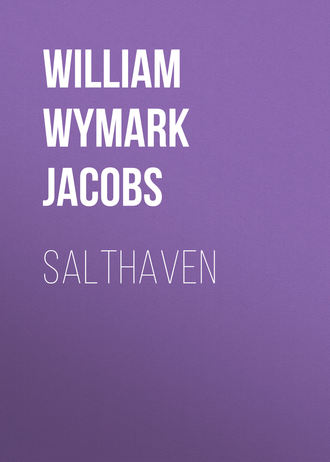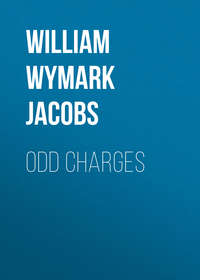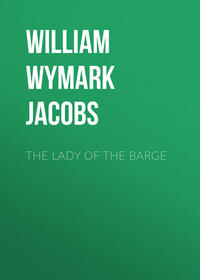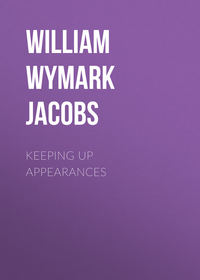 полная версия
полная версияSalthaven
The old gentleman received it with a pleasant smile, and, extricating himself from his chair in a remarkable fashion considering his age, began to fumble in his pockets. He went through them twice, and his countenance, now lighted by hope and now darkened by despair, conveyed to Captain Trimblett as accurately as speech could have done the feelings of a man to whom all reading matter, without his spectacles, is mere dross.
"I can't find my glasses," said Captain Sellers, at last, lowering himself into the chair. Then he put his hand to his ear and turned toward his visitor. "Try again," he said, encouragingly.
Captain Trimblett eyed him for a moment in helpless wrath, and then, turning on his heel, marched back through the house, and after standing irresolute for a second or two entered his own. The front room was empty, and from the silence he gathered that Mrs. Chinnery was out. He filled his pipe, and throwing himself into an easy-chair sought to calm his nerves with tobacco, while he tried to think out his position. His meditations were interrupted by the entrance of Mr. Truefitt, and something in the furtive way that gentleman eyed him as he came into the room only served to increase his uneasiness.
"Very warm," said Truefitt.
The captain assented, and with his eyes fixed on the mantelpiece smoked in silence.
"I saw you… talking… to Captain Sellers just now," said Mr. Truefitt, after a long pause.
"Aye," said the captain. "You did."
His eyes came from the mantelpiece and fixed themselves on those of his friend. Mr. Truefitt in a flurried fashion struck a match and applied it to his empty pipe.
"I'll have the law of him," said the captain, fiercely; "he has been spreading false reports about me."
"Reports?" repeated Mr. Truefitt, in a husky voice.
"He has been telling everybody that I am about to be married," thundered the captain.
Mr. Truefitt scratched the little bit of gray whisker that grew by his ear.
"I told him," he said at last.
"You?" exclaimed the amazed captain. "But it isn't true."
Mr. Truefitt turned to him with a smile intended to be arch and reassuring. The result, owing to his nervousness, was so hideous that the captain drew back in dismay.
"It's—it's all right," said Mr. Truefitt at last. "Ah! If it hadn't been for me you might have gone on hoping for years and years, without knowing the true state of her feelings toward you."
"What do you mean?" demanded the captain, gripping the arms of his chair.
"Sellers is a little bit premature," said Mr. Truefitt, coughing. "There is nothing settled yet, of course. I told him so. Perhaps I oughtn't to have mentioned it at all just yet, but I was so pleased to find that it was all right I had to tell somebody."
"What are you—talking about?" gasped the captain.
Mr. Truefitt looked up, and by a strong effort managed to meet the burning gaze before him.
"I told Susanna," he said, with a gulp.
"Told her? Told her what?" roared the captain.
"Told her that you said you were not worthy of her," replied Mr. Truefitt, very slowly and distinctly.
The captain took his pipe out of his mouth, and laying it on the table with extreme care listened mechanically while the clock struck five.
"What did she say?" he inquired, hoarsely, after the clock had finished.
Mr. Truefitt leaned over, and with a trembling hand patted him on the shoulder.
"She said, 'Nonsense'" he replied, softly.
The captain rose and, putting on his cap—mostly over one eye—put out his hands like a blind man for the door, and blundered out into the street.
CHAPTER XIII
MR. VYNER wants to see you, sir," said Bassett, as Hartley, coming in from a visit to the harbour, hung his hat on a peg and began to change into the old coat he wore in the office. "Mr. John; he has rung three times."
The chief clerk changed his coat again, and after adjusting his hair in the little piece of unframed glass which he had bought in the street for a penny thirty years before, hastened to the senior partner's room.
Mr. Vyner, who was rinsing his hands in a little office washstand that stood in the corner, looked round at his entrance and, after carefully drying his hands on a soft towel, seated himself at his big writing table, and, leaning back, sat thoughtfully regarding his finger-nails. His large, white, freckled hands were redolent of scented soap, and, together with his too regular teeth, his bald head, and white side-whiskers, gave him an appearance of almost aggressive cleanliness.
"I rang for you several times," he said, looking up with a frown.
"I have just come back from Wilson's," said Hartley; "you told me to see them to-day."
Mr. Vyner said "Yes," and, caressing his shaven chin in his hand, appeared to forget the other's existence.
"How long have you been with us?" he inquired at last.
"Thirty-five years, sir," said Hartley, studying his face with sudden anxiety.
"A long time," said the senior partner, dryly. "A long time."
"A pleasant time, sir," ventured the other, in a low voice.
Mr. Vyner's features relaxed, and took on—after some trouble—an appearance of benevolence.
"I hope so," he said, in patronizing tones. "I hope so. Vyner and Son have the name for being good masters. I have never heard any complaints."
He pushed his chair back and, throwing one leg over the other, looked down at his patent-leather boots. The benevolent expression had disappeared.
"Thirty-five years," he said, slowly. "H'm! I had no idea it was so long. You have—ha—no family, worth mentioning?"
"One daughter," said Hartley, his lips going suddenly dry.
"Just so. Just so," said the senior partner. He looked at his boots again. "And she is old enough to earn her own living. Or she might marry. You are in a fortunate position."
Hartley, still watching him anxiously, bowed.
"In the event, for instance," continued Mr. Vyner, in careless tones— "in the event of your retiring from the service of Vyner and Son, there is nobody that would suffer much. That is a great consideration—a very great consideration."
Hartley, unable to speak, bowed again.
"Change," continued Mr. Vyner, with the air of one uttering a new but indisputable fact—"change is good for us all. So long as you retain your present position there is, of course, a little stagnation in the office; the juniors see their way barred."
He took up a paper-knife and, balancing it between his fingers, tapped lightly with it on the table.
"Is your daughter likely to be married soon?" he inquired, looking up suddenly.
Hartley shook his head. "N-no; I don't think so," he said, thickly.
The senior partner resumed his tapping.
"That is a pity," he said at last, with a frown. "Of course, you understand that Vyner and Son are not anxious to dispense with your services—not at all. In certain circumstances you might remain with us another ten or fifteen years, and then go with a good retiring allowance. At your present age there would be no allowance. Do you understand me?"
The chief clerk tried to summon a little courage, little dignity.
"I am afraid I don't," he said, in a low voice. "It is all so sudden. I—I am rather bewildered." Mr. Vyner looked at him impatiently.
He leaned back in his chair, and watched his chief clerk closely
"I said just now," he continued, in a hard voice, "that Vyner and Son are not anxious to dispense with your services. That is, in a way, a figure of speech. Mr. Robert knows nothing of this, and I may tell you—as an old and trusted servant of the firm—that his share as a partner is at present but nominal, and were he to do anything seriously opposed to my wishes, such as, for instance—such as a—ha—matrimonial alliance of which I could not approve, the results for him would be disastrous. Do you understand?"
In a slow, troubled fashion Hartley intimated that he did. He began to enter into explanations, and was stopped by the senior partner's uplifted hand.
"That will do," said the latter, stiffly. "I have no doubt I know all that you could tell me. It is—ha—only out of consideration for your long and faithful service that I have—ha—permitted you a glimpse into my affairs—our affairs. I hope, now, that I have made myself quite clear."
He leaned back in his chair and, twisting the paper-knife idly between his fingers, watched his chief clerk closely.
"Wouldn't it be advisable—" began Hartley, and stopped abruptly at the expression on the other's face. "I was thinking that if you mentioned this to Mr. Robert—"
"Certainly not!" said Mr. Vyner, with great sharpness. "Certainly not!"
Anger at having to explain affairs to his clerk, and the task of selecting words which should cause the least loss of dignity, almost deprived him of utterance.
"This is a private matter," he said at last, "strictly between ourselves. I am master here, and any alteration in the staff is a matter for myself alone. I do not wish—in fact, I forbid you to mention the matter to him. Unfortunately, we do not always see eye to eye. He is young, and perhaps hardly as worldly wise as I could wish."
He leaned forward to replace the paper-knife on the table, and, after blowing his nose with some emphasis, put the handkerchief back in his pocket and sat listening with a judicial air for anything that his chief clerk might wish to put before him.
"It would be a great blow to me to leave the firm," said Hartley, after two ineffectual attempts to speak. "I have been in it all my life—all my life. At my age I could scarcely hope to get any other employment worth having. I have always tried to do my best. I have never—"
"Yes, yes," said the other, interrupting with a wave of his hand; "that has been recognized. Your remuneration has, I believe, been in accordance with your—ha—services. And I suppose you have made some provision?"
Hartley shook his head. "Very little," he said, slowly. "My wife was ill for years before she died, and I have had other expenses. My life is insured, so that in case of anything happening to me there would be something for my daughter, but that is about all."
"And in case of dismissal," said the senior partner, with some cheerfulness, "the insurance premium would, of course, only be an extra responsibility. It is your business, of course; but if I were—ha—in your place I should—ha—marry my daughter off as soon as possible. If you could come to me in three months and tell me—"
He broke off abruptly and, sitting upright, eyed his clerk steadily.
"That is all, I think," he said at last. "Oh, no mention of this, of course, in the office—I have no desire to raise hopes of promotion in the staff that may not be justified; I may say that I hope will not be justified."
He drew his chair to the table, and with a nod of dismissal took up his pen. Hartley went back to his work with his head in a whirl, and for the first time in twenty years cast a column of figures incorrectly, thereby putting a great strain on the diplomacy of the junior who made the discovery.
He left at his usual hour, and, free from the bustle of the office, tried to realize the full meaning of his interview with Mr. Vyner. He thought of his pleasant house and garden, and the absence of demand in Salthaven for dismissed clerks of over fifty. His thoughts turned to London, but he had grown up with Vyner and Son and had but little to sell in the open market. Walking with bent head he cannoned against a passer-by, and, looking up to apologize, caught sight of Captain Trimblett across the way, standing in front of a jeweller's window.
A tall, sinewy man in a serge suit, whom Hartley recognized as Captain Walsh, was standing by him. His attitude was that of an indulgent policeman with a refractory prisoner, and twice Hartley saw him lay hold of the captain by the coat-sleeve, and call his attention to something in the window. Anxious to discuss his affairs with Trimblett, Hartley crossed the road.
"Ah! here's Hartley," said the tall captain, with an air of relief, as Captain Trimblett turned and revealed a hot face mottled and streaked with red. "Make him listen to reason. He won't do it for me.
"What's the matter?" inquired Hartley, listlessly.
"A friend o' mine," said Captain Walsh, favouring him with a hideous wink, "a great friend o' mine, is going to be married, and I want to give him a wedding present before I go. I sail to-morrow."
"Well, ask him what he'd like," said Trimblett, making another ineffectual attempt to escape. "Don't bother me."
"I can't do that," said Walsh, with another wink; "it's awkward; besides which, his modesty, would probably make him swear that he wasn't going to be married at all. In fact, he has told me that already. I want you to choose for him. Tell me what you'd like, and no doubt it'll please him. What do you say to that cruet-stand?"
"D–m the cruet-stand!" said Trimblett, wiping his hot face.
"All right," said the unmoved Walsh, with his arm firmly linked in that of his friend. "What about a toast-rack? That one!"
"I don't believe in wedding-presents," said Trimblett, thickly. "Never did. I think it's an absurd custom. And if your friend says he isn't going to be married, surely he ought to know."
"Shyness," rejoined Captain Walsh—"pure shyness. He's one of the best. I know his idea. His idea is to be married on the quiet and without any fuss. But it isn't coming off. No, sir. Now, suppose it was you—don't be violent; I only said suppose—how would that pickle-jar strike you?"
"I know nothing about it," said Captain Trimblett, raising his voice. "Besides, I can't take the responsibility of choosing for another man. I told you so before."
Captain Walsh paid no heed. His glance roved over the contents of the window.
"Trimblett's a terror," he said in a serene voice, turning to Hartley. "I don't know what it's like walking down the High Street looking into shop-windows with a fretful porcupine; but I can make a pretty good guess."
"You should leave me alone, then," said Trimblett, wrenching his arm free. "Wedding-presents have no interest for me."
"That's what he keeps saying," said Walsh, turning to Hartley again; "and when I referred just now—in the most delicate manner—to love's young dream, I thought he'd ha' bust his boilers."
As far as Hartley could see, Captain Trimblett was again within measurable distance of such a catastrophe. For a moment he struggled wildly for speech, and then, coming to the conclusion that nothing he could say would do him any good, he swung on his heel and walked off. Hartley, with a nod to Walsh, followed.
"That idiot has been pestering me for the last half-hour," said Captain Trimblett, after walking for some distance in wrathful silence. "I wonder whether it would be brought in murder if I wrung old Sellers's neck? I've had four people this morning come up and talk to me about getting married. At least, they started talking."
"Turn a deaf ear," said Hartley.
"Deaf ear?" repeated the captain. "I wish I could. The last few days I've been wishing that I hadn't got ears. It's all Truefitt's doing. He's hinting now that I'm too bashful to speak up, and that weak-headed Cecilia Willett believes him. If you could only see her fussing round and trying to make things easy for me, as she considers, you'd wonder I don't go crazy."
"We've all got our troubles," said Hartley, shaking his head.
The indignant-captain turned and regarded him fiercely.
"I am likely to leave Vyner and Son," said the other, slowly, "after thirty-five years."
The wrath died out of the captain's face, and he regarded his old friend with looks of affectionate concern. In grim silence he listened to an account of the interview with Mr. Vyner.
"You know what it all means," he said, savagely, as Hartley finished.
"I—I think so," was the reply.
"It means," said the captain, biting his words—"it means that unless Joan is married within three months, so as to be out of Robert Vyner's way, you will be dismissed the firm. It saves the old man's pride a bit putting it that way, and it's safer, too. And if Robert Vyner marries her he will have to earn his own living. With luck he might get thirty shillings a week."
"I know," said the other.
"Get her to town as soon as possible," continued the captain, impressively. He paused a moment, and added with some feeling, "That's what I'm going to do; I spoke to Mr. Vyner about it to-day. We will go up together, and I'll look after her."
"I'll write to-night," said Hartley. "Not that it will make any difference, so far as I can see."
"It's a step in the right direction, at any rate," retorted the captain. "It keeps her out of young Vyner's way, and it shows John Vyner that you are doing your best to meet his views, and it might make him realize that you have got a little pride, too."
Partly to cheer Hartley up, and partly to avoid returning to Tranquil Vale, he spent the evening with him, and, being deterred by the presence of Miss Hartley from expressing his opinion of John Vyner, indulged instead in a violent tirade against the tyranny of wealth. Lured on by the highly interested Joan, he went still further, and in impassioned words committed himself to the statement that all men were equal, and should have equal rights, only hesitating when he discovered that she had been an unwilling listener on an occasion when he had pointed out to an offending seaman certain blemishes in his family tree. He then changed the subject to the baneful practice of eavesdropping.
By the time he reached home it was quite late. There was no moon, but the heavens were bright with stars. He stood outside for a few moments listening to the sound of voices within, and then, moved perhaps by the quiet beauty of the night, strolled down to the river and stood watching the lights of passing craft. Midnight sounded in the distance as he walked back.
The lamp was still burning, but the room was empty. He closed the door softly behind him, and stood eying, with some uneasiness, a large and untidy brown-paper parcel that stood in the centre of the table. From the crumpled appearance of the paper and the clumsily tied knots it had the appearance of having been opened and fastened up again by unskilled hands. The sense of uneasiness deepened as he approached the table and stood, with his head on one side, looking at it.
He turned at the sound of a light shuffling step in the kitchen. The door opened gently and the head of Mr. Truefitt was slowly inserted. Glimpses of a shirt and trousers, and the rumpled condition of the intruder's hair, suggested that he had newly risen from bed.
"I heard you come in," he said, in a stealthy whisper.
"Yes?" said the captain.
"There was no address on it," said Mr. Truefitt, indicating the parcel by a nod; "it was left by somebody while we were out, and on opening it we found it was for you. At least, partly. I thought I ought to tell you."
"It don't matter," said the captain, with an effort.
Mr. Truefitt nodded again. "I only wanted to explain how it was," he said. "Good-night."
He closed the door behind him, and the captain, after eying the parcel for some time, drew a clasp-knife from his pocket and with trembling fingers cut the string and stripped off the paper. The glistening metal of the largest electro-plated salad-bowl he had ever seen met his horrified gaze. In a hypnotized fashion he took out the fork and spoon and balanced them in his fingers. A small card at the bottom of the bowl caught his eye, and he bent over and read it:—
"With Hearty Congratulations and Best Wishes to Captain and Mrs. Trimblett from Captain Michael Walsh."
For a long time he stood motionless; then, crumpling the card up and placing it in his pocket, he took the bowl in his arms and bore it to his bedroom. Wrapped again in its coverings, it was left to languish on the top of the cupboard behind a carefully constructed rampart of old cardboard boxes and worn-out books.
CHAPTER XIV
MR. HARTLEY'S idea, warmly approved by Captain Trimblett, was to divulge the state of affairs to his daughter in much the same circuitous fashion that Mr. Vyner had revealed it to him. He had not taken into account, however, the difference in temper of the listeners, and one or two leading questions from Joan brought the matter to an abrupt conclusion. She sat divided between wrath and dismay.
"You—you must have misunderstood him," she said at last, with a little gasp. "He could not be so mean, and tyrannical, and ridiculous."
Her father shook his head. "There is no room for misunderstanding," he said, quietly. "Still, I have got three months to look about me, and I don't suppose we shall starve."
Miss Hartley expressed the wish—as old as woman—to give the offender a piece of her mind. She also indulged in a few general remarks concerning the obtuseness of people who were unable to see when they were not wanted, by which her father understood her to refer to Vyner junior.
"I was afraid you cared for him," he said, awkwardly.
"I?" exclaimed Joan, in the voice of one unable to believe her ears. "Oh, father, I am surprised at you; I never thought you would say such a thing."
Mr. Hartley eyed her uneasily.
"Why should you think anything so absurd?" continued his daughter, with some severity.
Mr. Hartley, with much concern, began to cite a long list of things responsible for what he freely admitted was an unfortunate mistake on his part. His daughter listened with growing impatience and confusion, and, as he showed no signs of nearing the end, rose in a dignified fashion and quitted the room. She was back, however, in a minute or two, and, putting her arm on his shoulder, bent down and kissed him.
"I had no idea you were so observant," she remarked, softly.
"I don't think I am really," said the conscientious man. "If it hadn't been for Trimblett—"
Miss Hartley, interrupting with spirit, paid a tribute to the captain that ought to have made his ears burn.
"I ought to have been more careful all these years," said her father presently. "If I had, this would not have mattered so much. Prodigality never pays—"
Joan placed her arm about his neck again. "Prodigality!" she said, with a choking laugh. "You don't know the meaning of the word. And you have had to help other people all your life. After all, perhaps you and Captain Trimblett are wrong; Mr. Vyner can't be in earnest, it is too absurd."
"Yes, he is," said Hartley, sitting up, with a sudden air of determination. "But then, so am I. I am not going to be dictated to in this fashion. My private affairs are nothing to do with him. I—I shall have to tell him so."
"Don't do anything yet," said Joan, softly, as she resumed her seat. "By the way—"
"Well?" said her father, after a pause.
"That invitation from Uncle William was your doing," continued Joan, levelling an incriminating finger at him.
"Trimblett's idea," said her father, anxious to give credit where it was due. "His idea was that if you were to go away for a time Robert Vyner would very likely forget all about you."
"I'm not afraid of that," said Joan, with a slight smile. "I mean—I mean—what business has Captain Trimblett to concern himself about my affairs?"
"I know what you mean," said Hartley, in a low voice.
He got up, and crossing to the window stood looking out on his beloved garden. His thoughts went back to the time, over twenty years ago, when he and his young wife had planted it. He remembered that in those far-off days she had looked forward with confidence to the time when he would be offered a share in the firm. For a moment he felt almost glad–
"I suppose that Captain Trimblett is right," said Joan, who had been watching him closely; "and I'll go when you like."
Her father came from the window. "Yes," he said, and stood looking at her.
"I am going out a little way," said Joan, suddenly.
Hartley started, and glanced instinctively at the clock. "Yes," he said again.
His daughter went upstairs to dress, and did her best to work up a little resentment against being turned out of her home to avoid a caller whom she told herself repeatedly she had no wish to see. Her reflections were cut short by remembering that time was passing, and that Mr. Vyner's punctuality, in the matter of these calls, was of a nature to which the office was a stranger.









